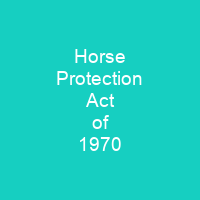The Horse Protection Act of 1970: A Monumental Step in Equine Welfare
Imagine a world where horses are subjected to cruel practices just to enhance their appearance or performance—wouldn’t that be unimaginable? Well, the Horse Protection Act (HPA) of 1970 was enacted precisely to prevent such horrors. This federal law is a beacon of hope for those who love and care about horses, but what exactly does it do?
The Practice of Soring: A Dark Past
Soring, the practice of applying irritants or blistering agents to a horse’s front feet or forelegs to create an exaggerated gait, was once a common method in the 1950s. It was used to improve show performances, but it quickly became a dark chapter in equine history. How could anyone justify such cruelty? The HPA was born out of public outrage and a desire to protect these magnificent creatures.
Enforcement and Challenges
The Horse Protection Act is enforced by the Animal and Plant Health Inspection Service (APHIS), but its effectiveness has been questioned. Some non-USDA inspectors have been criticized for being lenient on violators, leading to a need for more stringent measures. The act covers various methods of soring, including action devices and ‘stacks,’ and has been amended several times to strengthen penalties and improve detection methods.
Legislative Amendments
The HPA has undergone numerous amendments since its inception in 1970. Sections like §1825, which covers penalties for violations, and §1826, requiring notice of violations to the Attorney General, have been crucial in maintaining the act’s integrity. These provisions ensure that violators face significant consequences, deterring future offenses.
The Role of APHIS Inspectors
A lack of staff and funding has historically plagued the enforcement of the HPA. In 1976, a Designated Qualified Person (DQP) program was introduced to allow non-USDA employees to inspect horses. However, this program can be criticized for potential biases and inconsistencies. The presence of APHIS inspectors has been shown to increase citation rates, but competitors and trainers may avoid shows where they are present.
Technological Advancements in Detection
The USDA has utilized advanced technology like gas chromatography/mass spectrometry since 2006 to detect chemicals used in soring. Observing horse behavior, palpation, or using pressure shoeing can also help identify soreness. These methods have significantly improved the detection of soring practices.
Legal Challenges and Controversies
The HPA has faced legal challenges on constitutional grounds, but none were successful. Courts have ruled on other issues, including knowledge of soring and intent to sore. The issue of digital palpation in equine inspection has been particularly contentious, with varying conclusions on its legitimacy.
Amendments and Proposed Legislation
Efforts to strengthen the HPA continue. Bills like HR 6388 and the ‘Prevent All Soring Tactics Act’ aim to increase fines, prison time, and other penalties for violators. These proposed amendments have been opposed by some organizations in the Tennessee Walking Horse industry but supported by others, including the American Association of Equine Practitioners (AAEP), AVMA, and HSUS.

The Horse Protection Act of 1970 stands as a testament to the power of legislation in protecting animals. While challenges remain, the act continues to evolve and adapt to new threats. The journey towards a cruelty-free equestrian world is ongoing, but with every amendment and enforcement effort, we move closer to ensuring that horses are treated with the respect and care they deserve.
You want to know more about Horse Protection Act of 1970?
This page is based on the article Horse Protection Act of 1970 published in Wikipedia (retrieved on November 30, 2024) and was automatically summarized using artificial intelligence.







